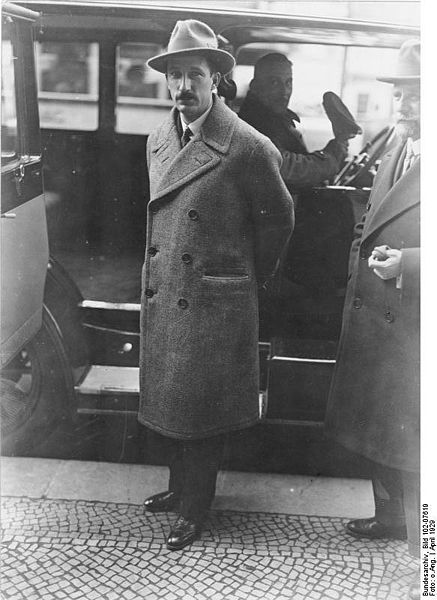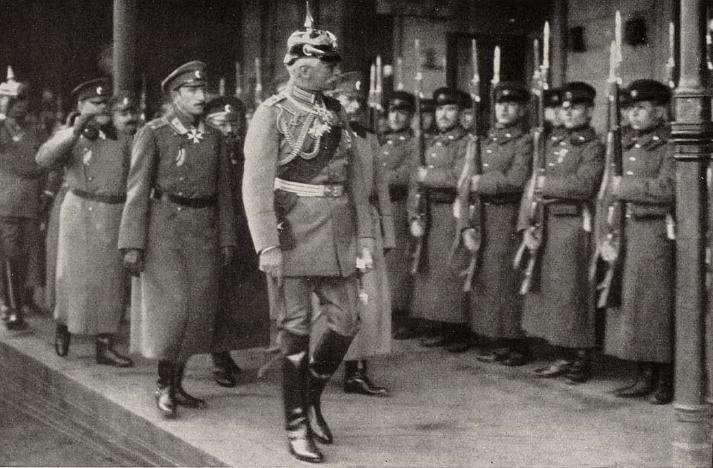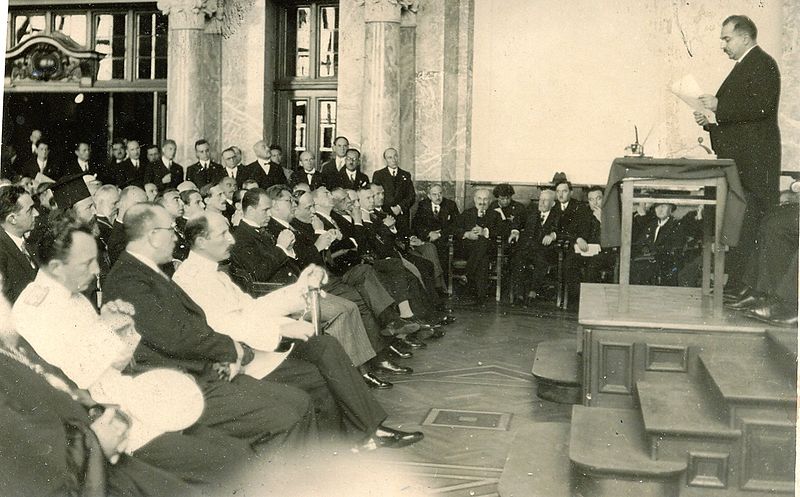<Back to Index>
- Naval Aviator Admiral John Henry Towers, 1885
- Writer Anton Hansen Tammsaare, 1878
- Tsar of Bulgaria Boris III the Unifier, 1894
PAGE SPONSOR


Boris III the Unifier, Tsar of Bulgaria (30 January 1894 – 28 August 1943), originally Boris Klemens Robert Maria Pius Ludwig Stanislaus Xaver (Boris Clement Robert Mary Pius Louis Stanislaus Xavier), son of Ferdinand I, came to the throne in 1918 upon the abdication of his father, following the defeat of the Kingdom of Bulgaria during World War I. This was the country's second major defeat in only five years, after the disastrous Second Balkan War (1913). Under the Treaty of Neuilly, Bulgaria was forced to cede new territories and pay crippling reparations to its neighbors, thereby threatening political and economic stability. Two political forces, the Agrarian Union and the Communist Party, were calling for the overthrowing of the monarchy and the change of the government. It was in these circumstances that Boris succeeded to the throne.
Boris was born on 30 January 1894 in Sofia. He was the first son of Prince Ferdinand of Bulgaria and his wife Princess Marie Louise. He was the first Bulgarian royal baby born on Bulgarian soil in a thousand years. In February 1896 his father paved the way for the reconciliation of Bulgaria and Russia with the conversion of the infant Prince Boris from Roman Catholicism to Eastern Orthodox Christianity, a move that earned Ferdinand the frustration of his wife, the animosity of his Catholic Austrian relatives (particularly that of his uncle, Francis Joseph of Austria) and excommunication from the Catholic Church. In order to remedy this difficult situation Ferdinand christened all his remaining children as Catholics. Nicholas II of Russia stood as godfather to Boris and met the young boy during Ferdinand's official visit to Saint Petersburg in July 1898.
He received his initial education in the so called Palace Secondary School which Ferdinand created in 1908 solely for his sons. Later Boris graduated from the Military School in Sofia and took part in the Balkan Wars. During the First World War he served as liaison officer of the General Staff of the Bulgarian Army on the Macedonian Front. In 1916 he was promoted to colonel and attached again as liaison officer to Army Group Mackensen and the Bulgarian Third Army for the operations against Romania. Boris worked hard to smoothen the sometimes difficult relations between field marshal Mackensen and the commander of the 3rd army lieutenant general Stefan Toshev. Through his courage and personal example he earned the respect of the troops and the senior Bulgarian and German commanders, even that of the Generalquartiermeister of the German Army Erich Ludendorff, who preferred dealing personally with Boris and described him as excellently trained, a thoroughly soldierly person and mature beyond his years. In 1918 Boris was made a major general and with the abdication of his father acceded to the throne as Tsar Boris III on 3 October 1918.
One year after Boris's accession, Aleksandar Stamboliyski (or Stambolijski)
of the Bulgarian People's Agrarian Union was elected prime minister.
Though popular with the large peasant class, Stambolijski earned the
animosity of the middle class and military, which led to his toppling
in a military coup on 9 June 1923. In 1925, there was a short border
war, known as the Incident at Petrich, with Greece which was resolved with the help of the League of Nations.
Also in 1925, there were two attempts on Boris's life perpetrated by
leftist extremists. After the second attempt, the military in power
exterminated in reprisals several thousand communists and agrarians
including representatives of the intelligentsia. In the coup on 19 May 1934, the Zveno military
organisation established a dictatorship and abolished the political
parties in Bulgaria. King Boris was reduced to the status of a puppet
king as a result of the coup. The
following year, he staged a counter coup and assumed control of the
country by establishing a regime loyal to him. The political process
was controlled by the Tsar, but a form of parliamentary rule was
re-introduced, without the restoration of the political parties. Boris married Giovanna of Italy, daughter of Victor Emmanuel III of Italy, first in Assisi in October 1930 (attended by Benito Mussolini), and then at an Orthodox ceremony in Sofia. The marriage produced a daughter, Maria Louisa, in January 1933, and a son and heir to the throne, Simeon, in 1937. Tsar Boris was on the cover of Time Magazine on 20 January 1941 wearing a full military uniform.
In the early days of
World War II, Bulgaria was neutral, but powerful groups in the country swayed its politics toward Germany (whom they had also allied with in World War I), which had gained initial sympathies by forcing Romania to cede southern Dobrudja back to Bulgaria. In 1941, Boris reluctantly allied himself with the Axis Powers in an attempt to recover Macedonia from Greece and Yugoslavia, which had been gained by Bulgaria in the First Balkan War and lost again in the Second. However,
in spite of this loose alliance, Boris was not willing to render full
and unconditional cooperation with Germany, and the only German
presence in Bulgaria was along the railway line which passed through it
to Greece. In early 1943, Nazi officials requested that Bulgaria send its Jewish population to German occupied Poland. The request caused a public outcry, and a campaign whose most prominent leaders were Parliament Vice-Chairman Dimitar Peshev and the head of the Bulgarian Orthodox Church, Archbishop Stefan, was organized. Following this campaign, Boris refused to permit the extradition of Bulgaria's 50,000 Jews. Initially,
the Bulgarian government, which he controlled, utilized Swiss
diplomatic channels to inquire whether possible deportations of the
Jews can happen to British controlled Palestine by ships rather than to
concentration camps in Poland by trains, for which the Germans
requested a significant amount of money. However, this attempt was
blocked by the British Foreign Minister, Anthony Eden (see A History of Israel: From the Rise of Zionism to Our Time by Howard M. Sachar,
Alfred A. Knopf, N.Y., 2007). Eventually, Boris did succumb to the
German demand for the extradition of 11,343 Jews from those territories
re-occupied by Bulgaria, but the extradition of the Jews from pre-war
Bulgaria was stopped. These two decisions have led to a position today
where a large number of people regard Boris as a hero for saving
Bulgaria's Jews, and a large number revile him for condemning those
from the occupied new territories. In point of fact, in war time
Europe, the Jewish citizens of the new territories of Macedonia and
Thrace were all under Hitler's high command and direct jurisdiction,
since they were not formally Bulgarian citizens. Under King Boris III,
Bulgaria was the only nation in Europe to save its entire Jewish
population during the Holocaust. Boris is the only world leader to defy
Hitler face to face during the war, refusing multiple times to deliver
his Jewish citizens beyond the borders of his kingdom. Most irritating for Hitler, however, was the Tsar's refusal to declare war on the Soviet Union or send Bulgarian troops to the Eastern front. On August 9, 1943, Hitler summoned Boris to a stormy meeting at Rastenburg, East Prussia, where Tsar Boris arrived by plane from Vrazhdebna on Saturday, August 14. While Bulgaria had declared a 'symbolic' war on the distant United Kingdom and the United States, at that meeting Boris once again refused to get involved in the war against the Soviet Union,
giving two major reasons for his unwillingness to send troops to Russia
— first, that many ordinary Bulgarians had strong Russophile
sentiments; and second, that the political and military position of
Turkey remained unclear. The war against the Western Allies,
however, turned into a disaster for the citizens of Sofia as
the city was heavily bombarded by the US and the British Royal Air
Force in 1943 and 1944. Nevertheless, the bombardments started only
after Boris' death. Shortly after returning to Sofia, Boris died of apparent heart failure on 28 August 1943. Conspiracy theories instantly
sprang up, many choosing to believe that he was poisoned by Hitler in
an attempt to put a more obedient government in place. The
evening before the illness occurred, Boris had an official dinner in
the Italian embassy. Others suggest that his death was a Communist plot
to destabilize the monarchy, and that Boris was poisoned while visiting
the Rila Monastery before getting ill. The question has never been
settled and many people remain of the belief that Boris was murdered,
in spite of no evidence being available. An autopsy of Boris's heart
conducted in the early 1990s revealed the cause of his death to be an infarction of the left ventricle, which for many laid to rest any speculation of foul play. Boris was succeeded by his six year old son Simeon II under a Regency Council headed by his brother, Prince Kyril of Bulgaria. Following a large and impressive state funeral at the Alexander Nevsky Cathedral, Sofia,
where the streets were lined with weeping crowds, the coffin of Tsar
Boris III was taken by train to the mountains and buried in Bulgaria's
largest and most important monastery, the Rila Monastery.
After taking power in September 1944, the Communist dominated
government had his body exhumed and secretly buried in the courtyard of
the Vrana Palace near
Sofia. At a later time the Communist authorities removed the zinc
coffin from Vrana and moved it to a secret location, which remains
unknown to this day. After the fall of communism, an excavation attempt
was made at the Vrana Palace, in which only Boris's heart was found, as
it had been put in a glass cylinder outside the coffin. The heart was
taken by his widow in 1993 to Rila Monastery where it was reinterred. A
wood carving is placed on the left side of his grave in the Rila
monastery, made on 10 October 1943 by inhabitants of the village of
Osoi, Debar district. The wood-carving has the following inscription: The United States Congress proclaimed King Boris III savior of fifty thousand Bulgarian Jews on May, 12 1994. King
Boris III was posthumously awarded the Jewish National Fund's Medal of
the Legion of Honor, the first non-Jew to receive one of the Jewish
community's highest honors. The
Jewish National Fund dedicated to Bulgaria a forest in Israel, a garden
named for King Boris, and a Bulgarian square in Jerusalem. The
Anti-Defamation League and Chabad have also honored King Boris III for
refusing to sacrifice his Jewish subjects to the Nazi juggernaut. A
film entitled "King's Heart" is currently in development, honoring King
Boris III and the largest and most dramatic rescue during the Holocaust. Tsar Boris III Boulevard is one of the main boulevards in Sofia and Plovdiv. Borisova Gradina is the largest park in Sofia. A huge picture of Tsar Boris hangs in the Alexandrov compound in Atlantic City, NJ.
“ To its Tsar Liberator Boris III, from grateful Macedonia. ”

